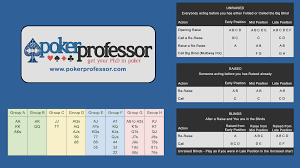Do you get frustrated that you lose easily after your first 2 hole cards? Discover how to make your starting hand selection complimentary to your strategy and win more money and less frustration in your next Texas holdem tournament.
Even before the dealer deals out the cards in a poker game, you already have some idea and concept about the strength of your hand. But is it really useful?
In my opinion, no. Sure, it would be beneficial to be presented with a post-flop strategic decision (situs togel resmi), but personally, I don’t like many of them. On the holdem table, you already have enough information at your disposal that you can easily and quickly calculate the probably strength of your next door opponent’s starting hand. Why bother?
All you can do is hope for a better hand. This may be a good reason to stay out of the hand (unless you’re in early position and check-raising would be a wise decision), but I still don’t like many of the possible strategies a player may go for when it comes to the flop and thus wouldn’t advise this approach.
This is apart of the whole family of approaches you can use in your Texas hold em tournaments that actually make money. How many times have you seen players fold to a raise pre-flop, only to complain after the fact that they “never won”, or “always get beat by the big blind”. If you are using a similar strategy, why aren’t you making some real money?
Here’s the deal. Most of us simply do not understand the optimal strategy of fold versus raise. We all know that we need to raise in order to get more money into the pot, but if we do, we must do it in the correct circumstances in order to win the pot. Folding may be the smartest play pre-flop, but this certainly won’t matter if you check-raise before the flop.
The real issue is that we must play not to lose. No matter what cards we may have, we must be ready to fold, or we will surely lose the hand. Grasping for such nuances in poker can be difficult, but it is well worth it.
I have many different opinions on the many different situations you may find yourself in pre-flop. I believe there are good hands and bad hands. Enough to win a pot, or not. That’s not to say that you should fold everything that gets dealt to you, but there are some hands that are surely poor bets, and some hands that you will make money with from the small blind.
There is a lot to be said about learning to identify your opponents tendencies in order to easily take advantage of them. But you can do so much faster and more effectively when you have instantaneous information. That’s why instant decisions are so important.
Just like in sports or in a casino, the gamblers or the casino wouldn’t want to be left in the dark. They would want an advantage, or some sort of information regarding the next move or the act of a player. A move by a player, or a series of moves by a player can signal information about the next possible move of the opponent. How his back position changes, his mindset, or lack of mindset, when he has a lot of chips on the table.
When observing a player, you don’t want to be swayed by his bet, nor should you consider his bet as a challenge. Mike Caro, in his book, The Book of Tells,Points of the Game, breaks characteristically into five groups, predatory, psychic, magical, technological and technical. These groups are not entirely accurate, but they provide a lot of information about the type of player each player is.
Players in the technical category are mostly nervous and reserve. They are not in tune with their opponents, because they are more concerned with technology than the table. Players who are nervous usually lack technology, because they worry about the complex task of technology used in performing a complex task.
Players who are magical are filtering through information too, and it is much like a human that has an automatic safety device for survival in the wild. They may not be concerned about technology so much, but the way they use it can say a lot about the way they view the game.
Players who are psychic are superdimensional in nature and do not understand the natural world as it is. They use astrology and numerology to create a world view for their advantage.
Players who are predatory always know something about their opponents, and they are usually reflecting an in-depth analysis of their opponents attitude, skills and reactions.
Players who are on the defensive usually say “I have no idea what you mean” when challenged.
